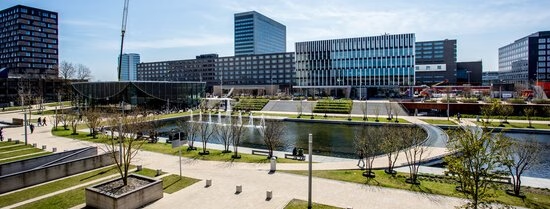In 2009, the International Institute of Social Studies (ISS) joined forces with Erasmus University Rotterdam (EUR).
The increasing integration of ISS with Erasmus University Rotterdam and its several large scale research programmes on issues such as cities, health, and innovation, also strengthen the ISS potential for scope and relevance more broadly and greatly increased our contribution to society. ISS researchers participate in various interdisciplinary teams with colleagues from other faculties of Erasmus University.
Highlighted collaborations
KidsRights Index
Measuring ranks how countries adhere to and are equipped to improve children’s rights
Vital Cities and Citizens
Erasmus Initiative - Helping improve the improve the quality of life in cities
Some of our collaborations
Exploring how social changes affect city life.

With the Erasmus Initiative ‘Vital Cities and Citizens’, EUR and ISS want to help improve the quality of life in cities.
In vital cities, the population can achieve their life goals through education, useful work and participation in public life. The vital city is a platform for creativity and diversity, a safe meeting place for different social groups.
The Rotterdam Global Health Initiative (RGHI) is the multi-disciplinary global health research and education network of Erasmus University (consisting of Erasmus School of Health Polity & Management, ISS, and Erasmus School of Economics) and Erasmus MC.
Through its research and education efforts, the Rotterdam Global Health Initiative (RGHI) seeks to help diminish health inequalities between and within countries, improve people’s living conditions, and contribute to more effective and equitable healthcare of good quality worldwide.
Addressing the gross inequalities in health between countries and between social strata within countries, requires a multi- and inter-disciplinary approach that encompasses the fields of health care sciences, parasitology and virology, public health and epidemiology, economics, the social and political sciences.
The institutes that constitute the RGHI bridge disciplinary boundaries to analyze global health problems from the level of the virus to the health centre, from health service logistics to governance, and from social stratification to population health outcomes.
Strategic alliance between three universities, such as the Centre for Frugal Innovation in Africa and the Governance, Migration and Diversity MA track.
The Dutch universities of Leiden, Delft and Rotterdam formalized their education, research and valorization collaboration in 2012 when they set up a strategic alliance.
The mission of the alliance is to collaborate in matters of substance and according to their own strengths, thereby contributing to current academic, social, and economic challenges.
As a part of EUR, ISS faculty contribute to this alliance in their teaching and research activities.
ISS offers this broadening minor on the solutions to poverty to EUR bachelor students
This 10-week broadening minor at ISS will enable students to:
- assess global trends in poverty and impoverishment;
- comprehend and apply various conceptualizations of poverty, vulnerability and social exclusion, analyze the multidimensional manifestations of poverty, and have an insight into the position of women and children as particularly vulnerable groups;
- develop an understanding of the design, potentialities and limits of current poverty reduction schemes and programmes at macro, meso and micro levels;
- identify alternative strategies, policy interventions and innovative subaltern responses aimed at eliminating poverty on the basis of principles of gender justice and social and economic justice.
Short course taught in collaboration with the Institute of Housing & Urban Studies (IHS).
This joint ISS-IHS course asks questions such as:
- How can we get our local economy to grow in an inclusive way?
- How do entrepreneurship and innovation affect local economy?
- What strategies are there to support local enterprises?
- Are your region's local economic policies driving sufficient investment to make it competitive?
Entrepreneurs and small businesses (firms or farms) are the backbone of local economy. Understanding the impact they have on its competitiveness is key to drafting policies that are effective but also inclusive. These policies should inspire social dialogue and bring together the community, businesses and government actors to support existing local capacities and make way for the development of new ones.
Annual global index on children's rights.
The KidsRights Index is an initiative of the KidsRights Foundation, in cooperation with ISS and the Erasmus School of Economics.
It is the annual global index which ranks how countries adhere to and are equipped to improve children’s rights.
It comprises a ranking for all UN member states that have ratified the UN Convention on the Rights of the Child and for which sufficient data is available, a total of 182 countries.
